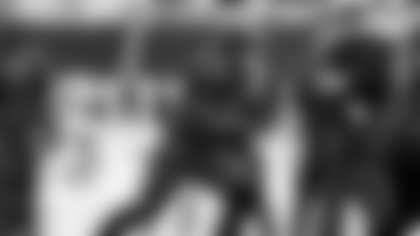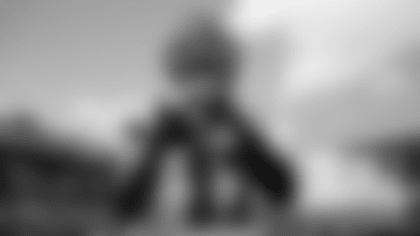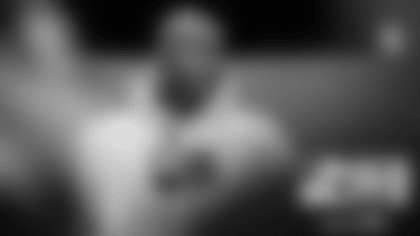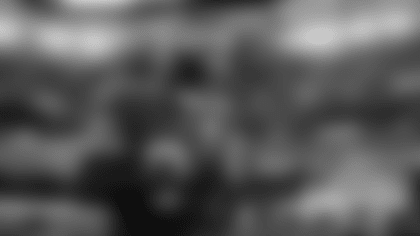Well, the title kinda says it all, doesn't it?
By now, if you've been following my career here on Buccaneers.com since 2004, or at least during the last couple years, you've figured out my pattern. During the offseason, I bring my full superpowers to bear in order to answer questions sent in by you, Tampa Bay fans. We have seven or eight months of entertaining back-and-forth, the Buccaneer brass reluctantly keeps me employed, and then football returns and we all focus on that.
Meanwhile, I use those four (sometimes five) months during the actual season to tick off the various things I need to take care of in order to stay among the superhero ranks. You know, battling my evil doppelganger, occasionally going rogue, pining over a forbidden love that can never be (don't tell the Answer Wife), etc. This past year, I did the whole voluntarily-give-up-my-powers-so-I-could-live-among-the-mortals thing. Ugh. I wouldn't recommend it.
Yes, of course, I regained my powers. That's the way that storyline always works, right. And now I'm back, and I'm focused, and I'm fired up, and I'm ready to take on your best. If you already know what I mean, here's the link to the page where you can begin submitting your queries right away.
For those who aren't familiar with my work here on Buccaneers.com, or would like a refresher, here's how it works:
I am here to answer questions you may have about the Buccaneers or the NFL in general. I love research and statistical analysis and I tend to ramble on for quite a bit when I get a question with some real meat on it. You can ask me about aspects of franchise history or the current team; you can try to stump me with a statistical query; you can even quiz me about general league matters. I'll probably know the answer, and if I don't, I'll find someone who does. Examples: Last year I provided answers to such questions as: Who are the winningest/losingest *assistant* coaches of all time? How often do new head coaches create an immediate turnaround? And how does 's career resemble that of Kobe Bryant? (No, I'm not making that up.)
Here are a few things I did NOT answer last year, and I won't be answering this year, so save your typing fingers: Who are the Buccaneers going to draft in April? Do you think we should keep Player A? Do you think we should sign Player B in free agency? Do you think Player C is good enough to keep his job in 2013? (Oh, and before you bother, don't ask "when the alternate black jerseys are coming back." The Bucs have NEVER worn black jerseys.)
Yes, I will offer my own opinions within many of my answers (and, yes, I might as well admit that I'm something of a homer), but I'm not here to discuss how good players or coaches are at their jobs. And, as for the draft, even if I knew what Mark Dominik and company were going to do (I don't), I couldn't reveal it at the risk of being an unemployed superhero (which worked out really well for Hancock).
As I've said, I've been doing this since 2004 and I have an extensive archive, which you might want to check out in order to get an idea of the types of discussions in which the readers and I usually engage. To give you another example, I opened up my inbox (which I hope will soon be quite a bit more full), and found a few leftover questions I didn't get to at the end of my last run of columns. Here's one to get us started on Volume 9 in 2013.
**
John B. of Tampa asks:
I was looking at some Bucs history the other day, and it hit. The Bucs have at least 4 Super Bowl winning quarterbacks (Williams, Young, Dilfer, Johnson). I know that there are some football teams that have 3 Super Bowl winning quarterbacks. Are there any other teams that have more Super Bowl winning quarterbacks than the Bucs? Are there any other notable Bucs that have gone on to win a Super Bowl with other teams?
Answer Man: First of all, John, some Buc fans might think you're picking at an old wound by saying we "have at least four Super Bowl-winning quarterbacks," since only one of those four actually won a ring with the Buccaneers. But your question doesn't seem to have ill intent, so let's just reword it a little bit and then get to the research. What you're asking me is, if you take all the quarterbacks who have won a Super Bowl and then list all the teams they played for in the NFL, which team is on the list most often? Could it be the Bucs, who won Super Bowl XXXVII with Brad Johnson at the helm and have also seen three of their former passers – Doug Williams (XXII) Steve Young (XXIX) and Trent Dilfer (XXXV) – go on to hoist the Lombardi Trophy? Let's do that and then get to your second question, because I have a caveat about answering that one, as well.
First, the raw numbers. A total of 29 different quarterbacks have started for winning teams in the 46 Super Bowls so far, beginning with the Packers' Bart Starr in the 1966 season and stretching most recently to the Giants' Eli Manning. Of those 29, 12 played (or are still playing) for only one team: Starr, Manning, Roger Staubach (Cowboys), Bob Griese (Dolphins), Terry Bradshaw (Steelers), Joe Theismann (Redskins), Phil Simms (Giants), Troy Aikman (Cowboys), John Elway (Broncos)*, Tom Brady (Patriots), Ben Roethlisberger (Steelers) and Aaron Rodgers (Packers). So that's the easy part of our count – two for Green Bay, Dallas, the Giants and Pittsburgh and one each for Miami, Washington, Denver and New England.
(* Technically, Elway was drafted by the Colts and then traded to Denver, but since he never spent any time at all with Indianapolis I'm going to say he was a Bronco only for the purposes of this analysis. Things are a little trickier with Kurt Warner, as you'll see below.)
That leaves 17 quarterback who won a Super Bowl with one team but played for at least one other during his career. Now, there are two sub-categories within this group: 1) Those who won a Super Bowl with one team after playing for a different team; and, 2) Those who won a Super Bowl with one team and the subsequently played for other teams.
Now, it seems to me that your question is really only asking about the former group, guys who STARTED with your team (that's the key) and then won a Super Bowl elsewhere. Someone like Trent Dilfer, who got his ring with the Ravens after six years with the Buccaneers. An example in the other group is Ken Stabler, who won a ring with the Raiders but then went on to play for the Oilers and the Saints. John, I don't think you mean to say that the Saints would now say they had two Super Bowl QBs – Drew Brees and Stabler. If I'm wrong about your intentions…oh, well. I guess you can write back with a clarification.
And, of course, you're going to count any quarterbacks who won a Super Bowl with your team, regardless of where they were before or after. That's the category in which you'll find Brad Johnson, who played for Minnesota and Washington before leading the Bucs to their title, then later went back to Minnesota and on to Dallas.
So, by those ground rules, we have to look at these somewhat itinerant quarterbacks: Len Dawson, Jim Plunkett, Doug Williams, Steve Young, Brett Favre, Kurt Warner*, Trent Dilfer, Brad Johnson and Drew Brees. A surprisingly short list. And, yes, you see three Buc connections among just those nine players.
(* Now we get to Warner. Most people know his story, including the stocking-grocery-store-shelves-between-football-jobs part. Warner wasn't drafted in 1994 but he came to the Packers' camp as an undrafted free agent. He didn't make the team, however, and later played in the Arena League before getting his shot in St. Louis and, ahem, making the most of it. Do we count him on Green Bay's list, even though he didn't play a game for them. The Answer Man's call, from the gut: Yes.)
The quarterbacks who won a Super Bowl with their first teams and then played elsewhere are: Joe Namath, Johnny Unitas, Ken Stabler, Joe Montana, Jim McMahon, Jeff Hostetler, Mark Rypien and Peyton Manning.
So, counting quarterbacks who won a Super Bowl with your team and quarterbacks who started with your team and then won a Super Bowl elsewhere, this is what you have, and it should add up to 38, as those in the short list three paragraphs above are going to be counted twice:
- Green Bay: 4 (Starr, Favre, Warner, Rodgers)
- Tampa Bay: 4 (Williams, Young, Dilfer, Johnson)
- N.Y. Giants: 3 (Simms, Hostetler, E. Manning)
- Pittsburgh: 3 (Bradshaw, Dawson, Roethlisberger)
- Washington: 3 (Theismann, Williams, Rypien)
- Baltimore/Indianapolis Colts: 2 (Unitas, P. Manning)
- Dallas: 2 (Staubach, Aikman)
- New England: 2 (Plunkett, Brady)
- Oakland: 2 (Stabler, Plunkett)
- San Francisco: 2 (Montana, Young)
- Atlanta: 1 (Favre)
- Chicago: 1 (McMahon)
- Cleveland/Baltimore Ravens: 1 (Dilfer)
- Denver: 1 (Elway)
- Kansas City: 1 (Dawson)
- L.A./St. Louis Rams: 1 (Warner)
- Miami: 1 (Griese)
- Minnesota: 1 (Johnson)
- New Orleans: 1 (Brees)
- N.Y. Jets: 1 (Namath)
- San Diego: 1 (Brees)
So, yeah, when it "hit" you the other day, John, you were right, or at least mostly right. The Packers have had four quarterbacks either win a Super Bowl with them or start there and win one elsewhere, like the Bucs. Of course, if you disagree with my decision and decide NOT to count Kurt Warner on the Packers' list, then Tampa Bay stands alone. I'm not sure it's worth splitting those hairs, however, since this isn't necessarily a positive or negative list.
And that takes me right into part two of your question. I'm happy to answer it (as you'll see, I was able to do so with a minimal amount of work, which the Answer Man always appreciates), but let's make sure we're approaching it with the right frame of mind. What I mean by that is, listing players who started with the Buccaneers and later got a ring elsewhere should not be seen as a referendum on the topic of "the ones that got away." You know why a player like Ronde Barber or Derrick Brooks is celebrated for spending an entire notable career with one team? Because it just doesn't happen that much anymore. Every team in the league can come up with dozens of examples of players who started with them and then won a ring elsewhere, and most Super Bowl-winning teams include several prominent members who started with another squad.
Look at that list of quarterbacks above. Four of the first seven Super Bowl-winning QBs (Starr, Staubach, Griese and Bradshaw) spent their entire careers with one team. Only three of the next 12 did (Theismann, Simms, Aikman). The Bucs' Super Bowl Championship team of 2002 had former Vikings (Johnson), Jaguars (Keenan McCardell), Jets (Keyshawn Johnson), Giants (Roman Oben), Cardinals (Michael Pittman), and on and on.
So, I'll answer the question, John, but let's be clear that I do not consider the following list a negative reflection on the Bucs in any way.
Well, I guess I should say I'll recycle the answer, because I actually fielded this one just two years ago, in Series 7, Volume 9. I had to update it to include Super Bowl XLVI last year, but that was a piece of cake, as there were no new additions to the list. The Patriots did have two former Bucs on their team last year in Kyle Arrington and Niko Koutouvides, but neither one was originally drafted by Tampa Bay. (John, you'll notice that, in order to avoid further research, I'm answering a slightly different question than what you asked, that being which players the Bucs drafted who went on to play in the Super Bowl with another team.)
Here's what I said back then to a hometown fan named Chris M.:
Alright, Chris, I have researched your answer, but I wouldn't say it was easy. Just to make sure I was thorough, I found a way to create a list of every player who has ever appeared in a Super Bowl, and then I cross-referenced it with our 35-year list of Buccaneer draft picks. Kinda tedious, to be honest with you.
But worth it, because the answer is pretty interesting (to me, at least, and probably to Chris). First the raw numbers: The Buccaneers have drafted 42 players who have gone on to play in a Super Bowl. Obviously, a good number of those were players the Bucs drafted who were on Tampa Bay's Super Bowl XXXVII-winning squad…specifically, 18 of them (which, when I think about it, is actually a pretty small percentage of the 53-man roster for that game.
And, actually, I should say 45-man roster, because that's what we're really talking about here. This is about men who actually played in a Super Bowl, not ones who were on the roster or injured reserve or the practice squad. That's just how we're defining it here. So, therefore, a guy like Dan Goodspeed, who was on the Bucs' roster for SBXXXVII but was inactive for the game does not count, but DeVone Claybrooks, who did play in the game does count.
One other note: I DID choose to include quarterback Steve Young, who was picked by the Buccaneers in the 1984 USFL dispersal draft.
However, what you specifically asked me was guys we drafted who have won a Super Bowl. That number is 30, which includes the 18 aforementioned winners with the Buccaneers. In case you were wondering, those 18 players were S John Lynch (1993); DT Warren Sapp and LB Derrick Brooks (1995); FB Mike Alstott (1996); CB Ronde Barber and LB Alshermond Singleton (1997); CB Brian Kelly and C Todd Washington (1998); K Martin Gramatica and S Dexter Jackson (1999); G Cosey Coleman and LB Nate Webster (2000); T Kenyatta Walker, CB Dwight Smith, S John Howell, FB Jameel Cook and DE Ellis Wyms (2001); and S Jermaine Phillips (2002).
Here are the other 12, in chronological order of when they were drafted by Tampa Bay:
- S/CB Curtis Jordan – drafted by Tampa Bay in the sixth round in 1976, played five years for the Buccaneers and later was a reserve for the Washington team that won SBXVII after the 1982 season.
- T Charley Hannah – drafted by the Bucs as a defensive end in the third round in 1977, converted to offensive tackle while still in Tampa, then went to Oakland and started at left guard for the team that won SBXVIII after the 1983 season. That was the first Super Bowl played in Tampa, by the way.
- RB Johnny Davis – drafted by Tampa Bay in the second round in 1978, jumped to San Francisco for just one season in 1981 before moving on to Cleveland and landed with the 49ers at the right time, playing on the team that won SBXVI after the 1981 season.
- QB Doug Williams – drafted by Tampa Bay in the first round in 1978, spent five seasons in Tampa, then went to Washington (after a stint in the USFL) and, after serving as the backup for most of the 1987 season, started in SBXXII and led the Redskins to a lopsided win over Denver.
- QB Steve Young - drafted by the Bucs in the first round of the USFL draft in 1984, played two seasons in Tampa before being traded to San Francisco and was the starting quarterback for the 49ers' wins in SBXXIV and SBXXIX after the 1989 and 1994 seasons, respectively.
- T Harry Swayne – like Hannah, was drafted as a DE by the Bucs, in 1987, before converting to the offensive line; played four seasons with Tampa and then began a very fortuitous tour of the league that landed him as a starter on three different Super Bowl teams; lost his first Super Bowl with San Diego after the 1994 season but then won SBXXXIII with Denver after the 1998 season and SBXXXV with Baltimore after the 2000 season.
- DE Rhett Hall – drafted by Tampa Bay in the sixth round in 1991, played three seasons for the Bucs and then spent one year in San Francisco, where he was a reserve for the team that won SBXXIX after the 1994 season.
- DT Santana Dotson – drafted by Tampa Bay in the sixth round in 1992, played four seasons with the Bucs and then hopped as a free agent to Green Bay in 1996, where he was a part of the Packers' winning squad in SBXXXI after the 1997 campaign, starting at right defensive tackle.
- P Klaus Wilmsmeyer – drafted by the Bucs in the 12th round in 1992 (the last year the draft had that many rounds), did not make Tampa Bay's roster but did end up in San Francisco for the next four years and won SBXXIX with the 49ers after the 1994 season.
- QB Trent Dilfer – drafted by Tampa Bay in the first round 1994, played six seasons with the Bucs, mostly as a starter, then jumped to Baltimore just in time to start for the team that would win SBXXXV (in Tampa) after the 2000 season.
- DT Anthony McFarland – drafted by the Bucs in the first round of the 1999 draft and was with the team for the 2002 Super Bowl year but was on injured reserve for the playoff run; eventually traded to Indianapolis, where he started for the Colts team that won SBXLI after the 2006 season.
- G Russ Hochstein – drafted by Tampa Bay in the fifth round in 2001 but only briefly appeared on the Bucs' roster before moving to New England and beginning a long career as, mostly, a reserve; played in three Super Bowls for the Patriots, winning SBXXXVIII and SBXXXIX after the 2003 and 2004 seasons.
In case you were wondering, here are the 12 guys drafted by Tampa Bay who were on the losing end of Super Bowls with other teams. Each player's name is listed with the round and year he was drafted by the Buccaneers, the Super Bowl(s) he played in and the team he played for in that (those) game(s):
- CB Jeremiah Castille (3rd round, 1983; XXII, Denver)
- S Mike Prior (7th round, 1985; XXXII, Green Bay)
- DE Ron Holmes (1st round, 1985; XXIV, Denver)
- RB Don Smith (2nd round, 1987; XXV, Buffalo)
- DT Reuben Davis (9th round, 1988; XXIX, San Diego)
- P Chris Mohr (6th round, 1989; XXVI, XXVII, XXVIII, Buffalo)
- DT Mark Wheeler (3rd round, 1992; XXXI, New England)
- DT Chidi Ahanotu (6th round, 1993; XXXVI, St. Louis)
- DE Regan Upshaw (1st round, 1996; XXXVII, Oakland)
- G Frank Middleton (3rd round, 1997; XXXVII, Oakland)
- DE Joe Tafoya (7th round, 2001; XL, Seattle)
- S Will Allen (4th round, 2004; XLV, Pittsburgh)
Well, it looks like I've completely satisfied the parameters of your question by this point, but I can't help adding a few items of interest in these lists.
For instance, isn't it amazing how many players drafted by Tampa Bay took part in Super Bowl XXIX between San Francisco and San Diego at the end of the 1994 season. The winning 49er team featured three former Buc draftees, while the losing Charger group had two more.
I also find it interesting that the two defensive tackles the Buccaneers drafted and immediately inserted into their lineup in 1992 – Mark Wheeler and Santana Dotson – ended up opposing each other in Super Bowl XXXI five years later. In fact, Wheeler and Dotson are both listed as the starters at right defensive tackle in that game for their respective teams, New England and Green Bay.
Former Bucs Doug Williams and Jeremiah Castille also squared off in Super Bowl XXII, and while Williams was the game MVP with his four touchdown passes and 340 yards, Castille did manage to snare the only interception of the game off the Redskin passer.
You'll notice that each of the Buccaneers' first three college drafts produced at least one player who would later play in (and win) a Super Bowl. However, after that they went four years before drafting another player who would make the big game (Jeremiah Castille in 1983) and five before drafting one who would eventually win a Lombardi Trophy (Steve Young in the 1984 USFL draft). If you don't count that USFL draft, then it wasn't until 1987 (Harry Swayne) that a Buc draft produced another Super Bowl winner.
Both McFarland and Hochstein were fortunate to get another chance elsewhere after several of their fellow draftees made it into Super Bowl XXXVII with the Buccaneers. McFarland, of course, got a ring with Tampa Bay but didn't actually get to play in a Super Bowl until his one season with the Colts. Hochstein was the only one of the first six players drafted by the Bucs in 2001 not to play in SBXXXVII with Tampa Bay, but he more than made up for that with his three-SB run in New England.
S Will Allen, a fourth-round pick in 2004, is the only player drafted by Tampa Bay since its own Super Bowl win after the 2002 season to have made it into a subsequent Super Bowl. So far!
Note also that three former Buccaneers later went on to play in a Super Bowl that was staged back in the home stadium of their original team: Charley Hannah, Don Smith and Trent Dilfer. Two others ended up playing against Tampa Bay in Super Bowl XXXVII as members of the Oakland Raiders: Regan Upshaw and Frank Middleton.
**
So, there, that's the idea. If you would like to get a similarly ridiculously long answer to your question, submit it now. I'll let a week or two pass to let the mailbag fill back up, and then we'll be on our way!

































